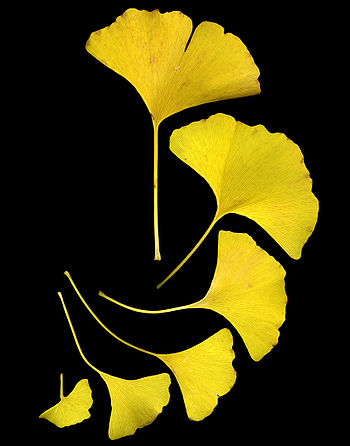
English: Ginkgo leaves shown in their fall color, yellow. Français : Des feuilles de Ginkgo dans leur robe d’automne. Italiano: Foglie di Ginkgo biloba nella caratteristica colorazione autunnale. (Photo credit: Wikipedia)
Recently, there have been suggestions that ginkgo (Ginkgo biloba) could be a treatment for Parkinson’s disease. This article is by an emergency room physician whose grandfather suffered from disabling Parkinson’s disease. The patient had been treated with Sinemet with little relief and was increasingly in danger of falling.
Because of concern that some of his symptoms could be due to poor circulation to the brain, he was started on a 24% extract of ginkgo 40 mg. three times a day. He was also started on a multivitamin. The “results were near-miraculous” over a six week period. He stopped falling, and his tremors were 80-90% improved. Before treatment with ginkgo, he had to be spoon fed. After treatment he could feed himself and go out to eat. He was able to continue living at home.
After 10 years of this treatment, the patient was placed in a nursing home where his tremors returned after discontinuation of his treatments. Though the tremors returned, they were not as strong as before he took ginkgo. He died 3 months later.
A 2004 study showed that ginkgo is neuroprotective and suggested use in Parkinson’s disease. It seems to work by monoamine-B inhibitor activity, which slows the breakdown of dopamine. There have some reports of some benefits in Parkinsonism from taking riboflavin and the active form of niacin. Vitamin E and vitamin C can delay the need for l-dopa (the standard treatment for Parkinson’s disease) for up to 5 years. A 2002 study showed that dietary vitamin E significantly reduces the risk of developing Parkinson’s disease.
CONCLUSION: In a single case of Parkinson’s disease, treatment with Ginkgo biloba and a multivitamin were able to prevent the need for institutional care for years.
To read the author’s abstract of the article, click on the title of the article. Then, to read the full article, click on the free full text icon.
PMID: 25105077.
Summary #676.

